Contributors Kevin Cookman and Aya Lehman headed to Sundance 2019, our second time covering the festival as accredited press! Here’s a roundup of what they’ve caught so far, presented alphabetically.
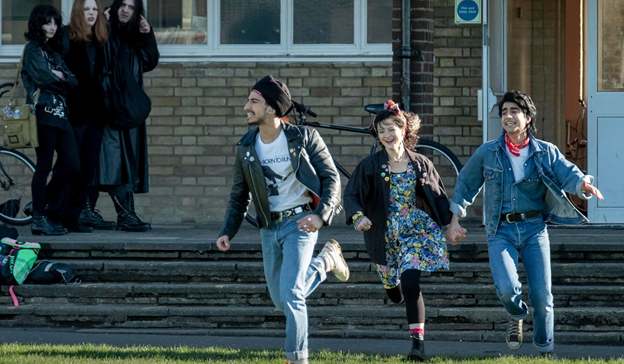
BLINDED BY THE LIGHT
Director: Gurinder Chadha
Genre: Comedy
I mean. Bruce Springsteen himself said he loved BLINDED BY THE LIGHT, so what can I REALLY say? Fans of Bruce will love it no matter what: Gurinder Chadha has crafted a love letter to The Boss that beautifully honors his influence and celebrates the universality of his music. Based on Springsteen fan Sarfraz Manzoor’s memoir Greetings from Bury Park, BLINDED is very sweet, very cheesy, a bit clunky, and suffers from sloppy editing and awkward pacing, but its message is positive and pure. Pakistani-British teen Javed discovers deep passions for The Boss and creative writing, thus rejecting his father’s desire for Javed to be a serious businessman. Soon enough, through the power of music, Javed is able to follow his dreams and win his father’s acceptance. We’ve seen it all before! This isn’t Chadha’s first rodeo: BLINDED is basically her BEND IT LIKE BECKHAM for Gen Z and their parents (and grandparents? Wow). It’s a tale as old as time, and while the production fails in certain areas, the film is a triumph in its celebration of the music of Bruce Springsteen. So far my favorite Sundance Story™ is from the premiere of BLINDED BY THE LIGHT—the tension in the room was INSANE as everyone waited to see if Bruce himself would make an appearance. As soon as the director announced that he wouldn’t be in attendance because he didn’t want to “overshadow the film,” the energy completely shifted and people started filling out during the Q&A. What a bummer. [Aya Lehman]

BRITTANY RUNS A MARATHON
Director: Paul Downs Colaizzo
Genre: Comedy
It is outrageous that BRITTANY RUNS A MARATHON is writer/director Paul Downs Colaizzo’s first foray of any kind into film. Starring Jillian Bell as his real-life best friend who (spoiler alert) ran a marathon, the film follows Brittany as she decides to turn her life around and begins training for the New York City Marathon. Making a film about weight loss can be extremely tricky, but BRITTANY treats its lead with such care that her pursuit never feels shame-driven: it’s simply her means of developing a healthier lifestyle. It’s easy for films in this vein to get caught up in unimportant tangents, but BRITTANY is focused—the story avoids feeling contrived and secondary characters are fleshed out but never distract from our heroine’s journey towards self-improvement. Jillian Bell is otherworldly funny and Colaizzo’s direction allows her to fully flex her natural ability while maintaining the balance of heart and humor. It’s no surprise this has been Amazon’s largest acquisition of the festival at $14 mil—Colaizzo and Bell undoubtedly have prolific careers ahead of them. [Aya Lehman]
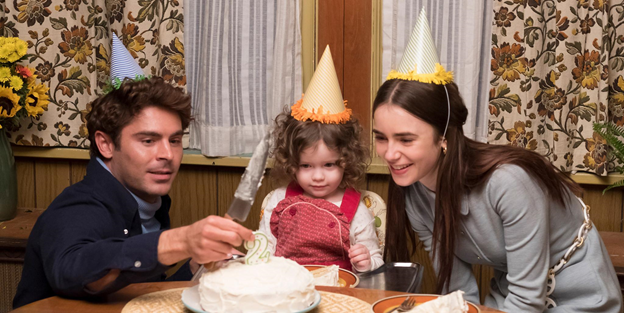
EXTREMELY WICKED, SHOCKINGLY EVIL AND VILE
Director: Joe Berlinger
Genre: Biography, Drama
EXTREMELY WICKED’S intention is to trick you—too late you realize that you’re not entirely sure who you’re rooting for, but part of you might be rooting for Ted Bundy. Zac Efron is, and always has been, so charming, and director Joe Berlinger perfectly manipulates his charisma to distract you, to withhold gritty details about the case so that you understand why these women fell for Bundy. It’s no surprise Berlinger nails this portrayal of Bundy, having directed the Netflix documentary series THE TED BUNDY TAPES, released days before the premiere of EXTREMELY WICKED. The two act as companion pieces—TAPES is proper True Crime, laying out facts of the case, while EXTREMELY WICKED offers a deeper character study of Bundy via his own perspective as well as those of the women in his life. The film is, after all, based on the book The Phantom Prince, written by Bundy’s ex-girlfriend Elizabeth Kloepfer, in which she details her struggle with accepting Bundy as a monster.
Overall, Berlinger succeeds in his deception—Bundy isn’t shown committing a crime until the final five minutes of the film, and the only glimpse of malevolence we see is when Bundy and then-girlfriend Liz are looking to adopt a shelter dog and the dog stares Bundy down and barks in his face (it’s as hilarious as it sounds). It’s brilliant to subvert Zac Efron’s mass appeal and obvious charisma so as to make a movie about how easy it is to fall for a serial killer, but that’s where the brilliance tapers off. Very cool of Berlinger to give attention to the women in Bundy’s life, but he says his whole purpose is to show how easy it is to fall in love with a psychopath. It’s like… boy, women know we’ve ALL dated one!! The film never lands on a solid tone and interrupts whatever flow it manages to find with misplaced attempts at humor. It’ll be worth a stream for the revival of Zac Efron’s gap tooth and John Malkovich’s weirdly comedic turn as the Florida judge who convicted Bundy. That’s about it. [Aya Lehman]
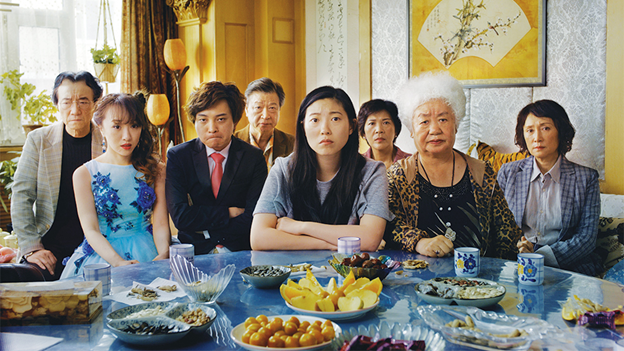
THE FAREWELL
Director: Lulu Wang
Genre: Comedy
The undisputed darling of Sundance 2019, THE FAREWELL stars Awkwafina as Billi, a young woman who must return to China to say goodbye to her dying grandmother. But per her family’s tradition, her grandmother doesn’t know that she’s dying, so the family throws a fake wedding celebration as an excuse to bring everyone together one last time. Billi struggles to maintain the facade as her emotions get the best of her, and finds her American upbringing clashing with her family’s Chinese heritage. Awkwafina delivers a career-defining performance as she so naturally inhabits the role of a grieving woman who also has to put up with her family AND has to face her own cultural confusion as a Chinese-American woman. Her range is on full display as she masks this intense sorrow with perfectly timed jokes and effortlessly explores every stage of grief. THE FAREWELL is a brilliantly simple and naturalistic familial study that explores a topic that is universal yet deeply personal, and firmly holds its audience between laughter and hysterical tears for the majority of its runtime. With a script in both English and Chinese, Lulu Wang masterfully captures the nuance of a multicultural family doing their best to maintain a lie and embrace tradition. [Aya Lehman]
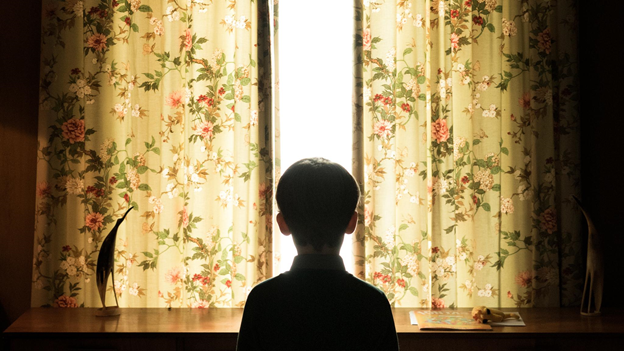
THE HOLE IN THE GROUND
Director: Lee Cronin
Genre: Horror
Lee Cronin’s slice of Irish horror is a PET SEMATARY–meets-THE BABADOOK rip-off that barely gets by with its subtle spin on children produced from past abusive relationships subsisting the purportedly escaped anguish of emotional and physical captivity, a concept that is THE HOLE IN THE GROUND’s freshest contribution to the genre. Cronin borrows from every major supernatural mystery of the 21st century, and culls together some monster movie frills too, yet he impressively fails to capture any of what gave these factors their lauded places in cultural history. Lead actress Seána Kerslake holds her own against the onslaught of uninspired tropes haunting her and her son, with a third-act line-delivery in which she ascertains the truth of her son’s spider-eating abnormalities and confronts the brat standing tall as both a gut-punch and a victorious decree. She’s wonderful, but, wow, it is wild how A24 is producing its own C-grade Redbox lookalikes. [Kevin Cookman]
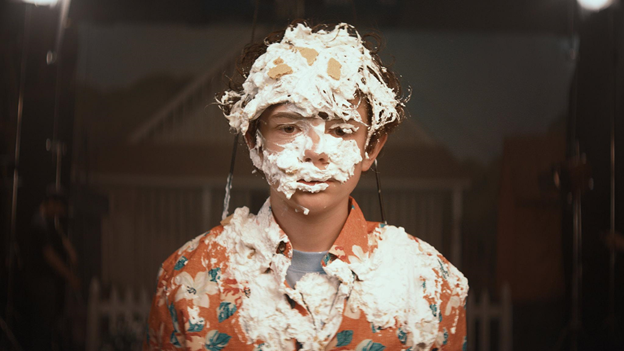
HONEY BOY
Director: Alma Har’el
Genre: Drama, Biography
How do you close a door? “Pull with one hand and push with the other.” Written by and starring Shia LaBeouf, HONEY BOY is a cousin of MID90S, but instead of a boy with an absent father, Otis’ father is omnipresent. The film follows two stories: grown-up Otis, recently enrolled in rehab, and young Otis, a child actor starring on a children’s sitcom. Might sound… Kind of… Familiar…. As Shia LaBeouf details the personal traumas he’s coming to terms with in the modern day via an incredible Lucas Hedges, he accompanies his younger self (Noah Jupe) and takes on the role of his own abusive father. The entire film is a therapy session for LaBeouf as he acknowledges the trauma caused by his alcoholic father and inhabits the very man who passed down the unhealthy coping mechanisms that lead Otis to court-appointed rehab. HONEY BOY has a lot to say about inherited trauma, alcoholism, and, most significantly, toxic masculinity. It’s a powerful film that works stylistically and lands emotionally, but feels like it’s holding back in terms of how experimental it could have (should have?) been. It’s a clean take that will appeal to a broader audience, but there are these little flashes of just how far LaBeouf and director Alma Har’el could have taken this experiment. It succeeds in what it sets out to do, though, and further propels Shia LaBeouf on his apology tour. [Aya Lehman]
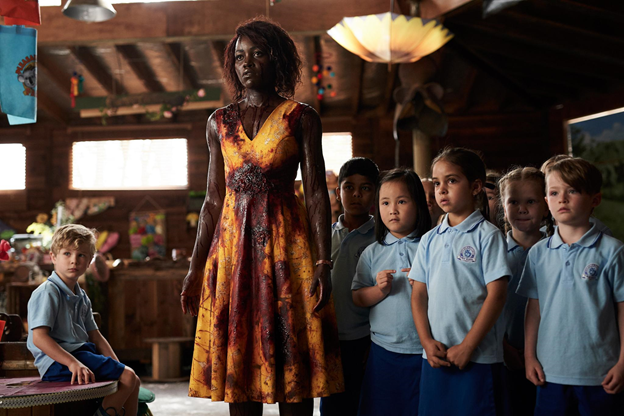
LITTLE MONSTERS
Director: Abe Forsythe
Genre: Comedy
To say I’m in awe of how Lupita Nyong’o has manufactured and selectively curated her own career trajectory is an understatement; for being one of the most popular international actresses, she’s been in surprisingly little since her first(!) on-screen role in 2013. It’s not even that she’s Tom Cruising it, chomping at the bit to work with a long list of established auteurs, rather focusing on showcasing her range through sheer genre variety. Her intense personal management was the only factor that got me remotely interested in LITTLE MONSTERS, a trite, COOTIES-look-alike zombie comedy that had a logline from 2008 and Josh Gad: blech. A Sundance zombie comedy in 2019? What a time warp. What helps LITTLE MONSTERS succeed is exactly that—this broad-ass, goofy, juvenile throwback farce is BILLY MADISON–meets-Dead Rising. Lightning-quick, confident raunch (that, admittedly, I wish was accompanied by a stronger visual flare) filled with perfectly-placed absurdist screaming matches, fat-man-falls slapstick, and viscera-packed gore. Alexander England is a slob revelation as a jeering David Spade-type with the wrecking ball energy of a Chris Farrelly slacker, trying to woo Nyong’o’s magnetic comedic turn as a kindergarten teacher who has nothing to live for but the protection of her students’ well-being and purity—making sure the brats aren’t eaten is as tantamount as ensuring that they all believe this apocalyptic scenario is just a game. As they’re encroached by a swarm of the undead, Nygong’o makes the kids get into a singing conga line to zig zag to safety, and this is *after* she sings them a ukulele cover of “Shake It Off.” I can’t wait to surprise my future eight-year-old with an extra-large pizza, a tub of gummy worms, and a full keg for a “don’t tell Mom” screening of LITTLE MONSTERS. [Kevin Cookman]
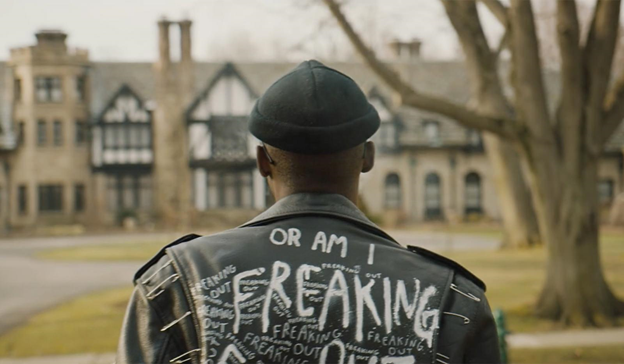
NATIVE SON
Director: Rashid Johnson
Genre: Drama
Replacing the white-hot rage of Richard Wright’s seminal novel, perhaps, and controversially, the most influential piece of African-American fictional literature of the 20th century, with Gen-X malaise, Rasheed Johnson’s NATIVE SON, an audacious debut if only for his selection of adaptation, neuters the fervent rot of anger. Gone is Bigger Thomas, the constantly erupting time-bomb of 1940, here is Lil Bigger Vert of the 2010s: a green-haired, nail-polished punk enthusiast and Black lit-loving 20-year-old. It’s an odd departure, one seemingly designed to flex the (tired) auteurist notion of loving Bad Brains and contrast the commentary of Bigger’s “I AM FREAKING OUT” text-ridden leather jacket with his surroundings as much as possible. It’s purely window-dressing for a character lacking definition. He’s a wallflower, a leaf carried by the wind. When the plot elements of the novel kick in, you don’t believe for a second that this Bigger wouldn’t just leave the room or extinguish the situation himself. Ripping the character from Bigger forces the narrative to bend horribly unnatural acts of violence into naturally occurring plot beats, betraying both the source material and the very rendition Ashton Sander’s committed, yet head-barely-above-water performance created here. In the attempts to make the fall of Bigger Thompson a naturally occurring one, rather than one explicitly linked to his own heinous instincts and morals, it stretches the plot to its seams, with the inciting incident taking place a whole hour into the picture. It’s a drag. Johnson, held at task to translate an incendiary novel to the screen, turned a film that would incite theater firebombings—a movie that arguably should not be made—into one just like any movie ever made. Brave, dangerous works deserve equal adaptations; NATIVE SON is the plodding dousing of an awesome flame. [Kevin Cookman]
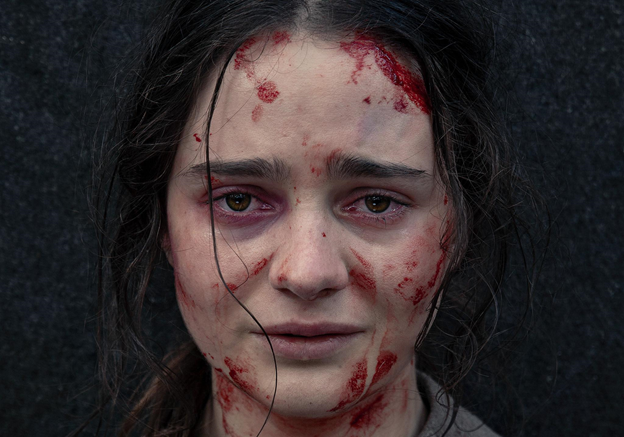
THE NIGHTINGALE
Director: Jennifer Kent
Genre: Horror, Western
Jennifer Kent’s follow-up to THE BABADOOK, a sorrowful modern horror classic, steeps its fears in all but the supernatural, exhibiting the abhorrent birth of all nations. Pillaging of native lands as expressed through the rape and usage of women’s bodies, THE NIGHTINGALE is a nightmarish, utterly unforgiving descent into the pits of men’s souls, these filthy brutes on a campaign of extermination justified and dutifully enforced by executive decree. Expect unending stomach knots throughout this period horror-western, trapping you in both its runtime and academy ratio that evokes the moral and physical brutality of Peckinpah, but none of the relish in masculine posturing that gives his works the lighter air of outlaw iconography. In her recreation of systemic abuse, Kent ends up creating an artificial version of it for her viewers. Don’t look away. Your forefathers committed these crimes. Your foremothers sat and watched. THE NIGHTINGALE is 1974 primal horror, really the best movie Wes Craven never made, but with the technical precision capable with modern tech and a century’s worth of genre knowledge. It certainly helps that what kept Craven back, his litany of bad actors, is nonexistent here: Aisling Franciosi is a stone-cold powerhouse, her eyes capable of maintaining the most magnetic of gazes and the most cavernous of desolation. With THE NIGHTINGALE, Jennifer Kent has returned with one of the best films of 2019, but also one of the most bleak and punishing films I’ve ever seen. Viewer beware. [Kevin Cookman]
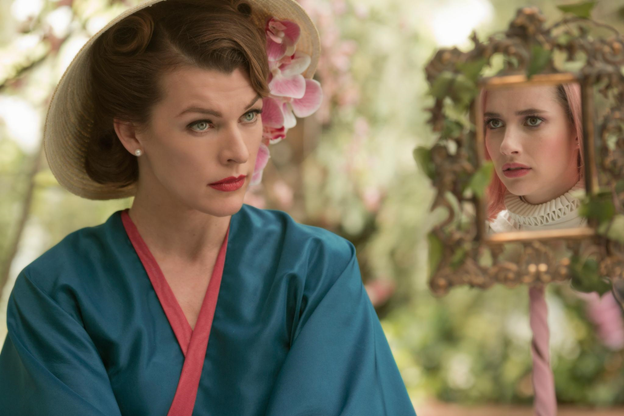
PARADISE HILLS
Director: Alice Waddington
Genre: Fantasy
Barely a Black Mirror pitch with a Disney Channel Original Movie aesthetic, PARADISE HILLS’ vacuous aesthetics leave the stale, insubstantial taste of Mother’s Circus Animal cookies, all the while punishing its audience with a brutal lead performance from Emma Roberts and a hollow social message that feels derived from someone who attended a single Women’s March, watched a Charli XCX video, and skimmed an article about conversion therapy. By no means are Waddington’s messages negative, for I could definitely foresee PARADISE HILLS’ morals landing hard with middle schoolers looking for darker PG fare, but she’s exploring these ideas as deftly as a campaign button does. It all feels like the obnoxiously overstated parody of a fake Hollywood movie that Assayas would recreate for a scene, but I will say, it is impressive in its faithful simulation of waiting in line for an at-capacity party next to a screenwriter who unsolicitedly pitches you their entire YA spec script. Didn’t BEAUTIFUL CREATURES, a catastrophic 2013 fantasy flop, kill this type of movie? Send another shooter, because the body’s still twitching. [Kevin Cookman]
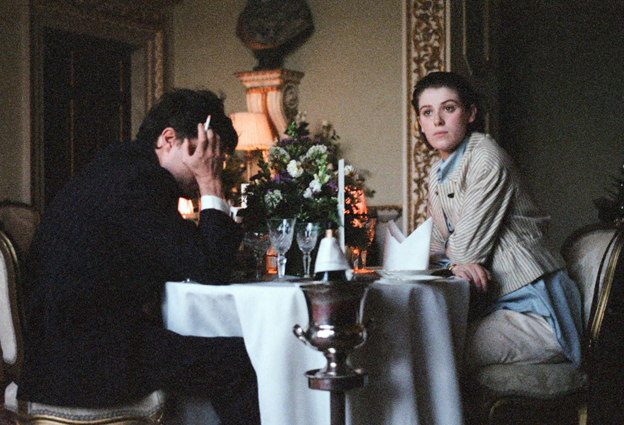
THE SOUVENIR
Director: Joanna Hogg
Genre: Drama
Exiting Joanna Hogg’s THE SOUVENIR, my mind dizzied. This beautifully, painfully, fully realized recollection of lovelorn memories sees 25-year-old film student Julie falling for Anthony, an older state employee with a penchant for heroin and the face of Peter Lorre. I couldn’t quite pin down how the filmic elements meshed to generate such, I suppose, quiet, elusive majesty—THE SOUVENIR is not showy, but it certainly is not restrained, what with its major landscapes, extraneous discussions of cinema soused in pretension, and sheer variety of meta-textual screen components, most prominent being the casting of real mother and daughter in Tilda Swinton and Honor Swinton-Byrne. Every scene is met with a duality of reality and artificiality, often so subtly that you can miss the strike of the match altogether. This is boldly self-assured cinema. It is not a film of conclusions, but rather of the processes in which we evaluate the events of our life to perhaps one day learn the lessons we were supposed to procure from them. How we construe reality to create a new vision of our own creation is as equally applicable to cinema as it is to awareness of the self. Hogg is requiring the viewer to put in much more work than is often expected for narrative cinema—it may serve at the detriment of the film’s legacy, but its efforts are infinitely rewarding for those willing. [Kevin Cookman]
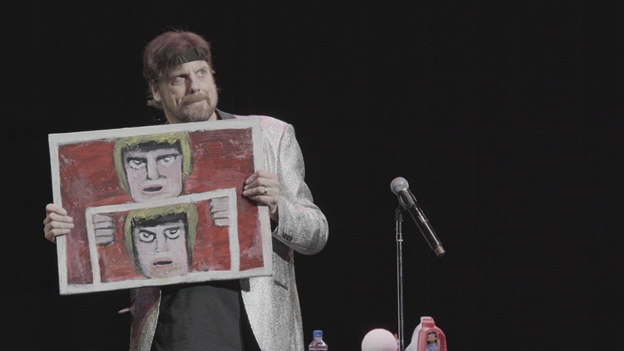
THE UNTITLED AMAZING JOHNATHAN DOCUMENTARY
Director: Ben Berman
Genre: Documentary
A doc about a magician with a twist: this is all I knew going in to the film and all I recommend any future viewer knowing. It’s a simple setup: The Amazing Johnathan, a famous Las Vegas magician/stand up, is dying. In 2014 he was given one year to live, but in 2017, he’s still very much alive. Director Ben Berman, known for his work on COMEDY BANG BANG, joins Johnathan and his wife Anna on the road for three post-retirement shows. A few weeks into shooting, Ben discovers Johnathan hasn’t been completely honest with him, and the production spirals. But it’s in the spiral that the film finds its purpose. Berman’s previous work on Comedy Central series aids him in finding catharsis in chaos: he captures Johnathan’s mania as deftly as his own. At a certain point the doc strays from Johnathan in favor of asking Ben difficult questions: Why is his take on Johnathan’s life meaningful? What do you do when you’re making a documentary about death but your subject isn’t dead? It’s a move that could easily be some self-possessed superficial dive into Ben’s ego, but it strikes a perfect balance between comedy and true introspection as he tracks his own relationship with death. Hilarious until the literal last moment (a name in the credits is the film’s final punchline) and a moving portrait of its subject and its creator—it’s amazing to watch a documentary defend its own existence. Learn nothing more and you’ll be delighted. Also, Eric Andre wears a t-shirt that says “PEE IS STORED IN THE BALLS” over the Joy Division UNKNOWN PLEASURES album art in every talking head. A masterpiece. [Aya Lehman]
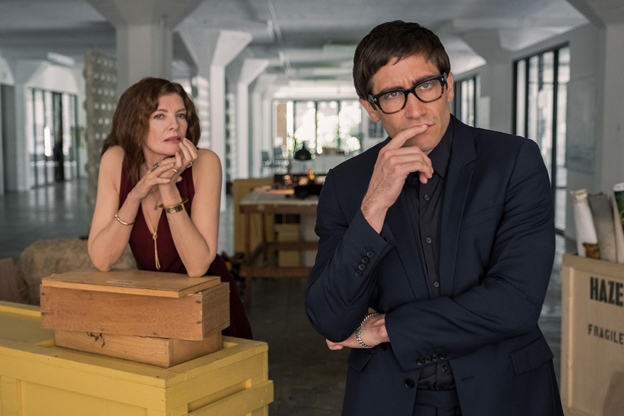
VELVET BUZZSAW
Director: Dan Gilroy
Genre: Thriller
Oh, VELVET BUZZSAW, how you betrayed me so. A gravely disjointed, TV-movie-of-the-week slasher flick that’s too self-serious to be ripe, WAXWORK midnight trash, but too forcibly off-kilter to succeed as a functional or valuable satire on the consumption and seizure of art. Gilroy, fresh off the failure of ROMAN J. ISRAEL, ESQ., doesn’t make it funny enough, nasty enough, or chaotic enough—it’d be one thing if this was a bizarre disaster, perhaps a foggy mess of a cult-classic curio (like polarizing festival misfit WOUNDS), but the flat filmmaking is so inert that it negates the eccentric ingenuity of, I don’t know, say, a portrait of monkeys possessed by a deranged artist manifesting as a FINAL DESTINATION specter of death coming to life and killing a man. Has more characters than it knows what to do with and plot developments so sudden that you’re convinced the movie skipped a reel or two—Jake Gyllenhaal goes crazy, but the train of logic that gets him to his breaking point isn’t anywhere near the station. Toni Collette rules, though. A pivotal scene with her and a spherical art installation, and the follow-through, is VELVET BUZZSAW realizing its truest, most gonzo, most illuminating potential. When the movie goes unhinged, which is not nearly enough, it’s a riot. Had this followed its credo of “all art is dangerous,” we’d really be cooking with gas. [Kevin Cookman]



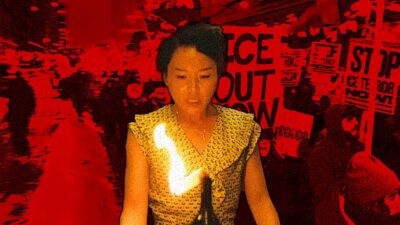
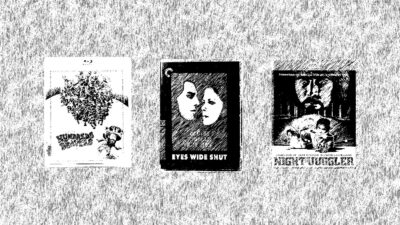










Comments